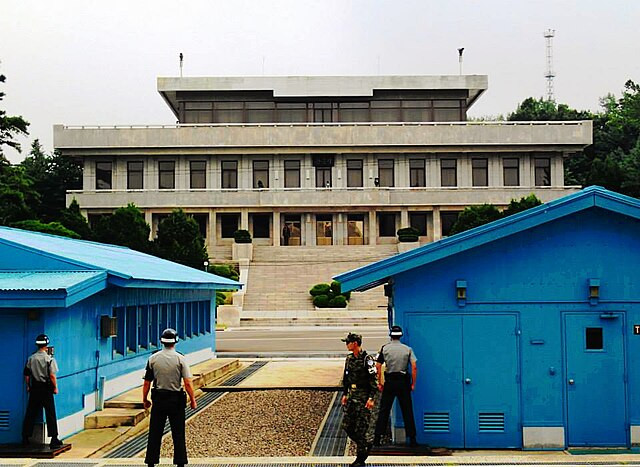South Korea's military fired warning shots after a group of about 20 North Korean soldiers crossed the heavily fortified demilitarized zone (DMZ) separating the two Koreas over the weekend. The incident, which occurred at around 12:30 p.m. on Sunday, has further heightened tensions between the two nations, already strained due to recent hostile exchanges involving propaganda and provocations.
The South Korean Joint Chiefs of Staff (JCS) reported that the northern troops breached the military demarcation line inside the DMZ, a region notorious for its dense foliage and difficult visibility. "We do not believe the incursion was intentional," said Colonel Lee Sung-jun, JCS spokesperson, noting that the soldiers immediately retreated north after the warning shots were fired.
The JCS further indicated that the North Korean soldiers were carrying construction tools and may have inadvertently strayed into South Korean territory. An unnamed JCS official told Yonhap News Agency that the troops appeared to be engaged in some form of construction work and likely "lost their way" in the heavily wooded area where demarcation signs are not clearly visible.
The breach occurred amidst a backdrop of increasing hostility between the two Koreas, characterized by a series of provocative actions. South Korea recently resumed anti-Pyongyang loudspeaker broadcasts along the border, a practice halted years ago, as a countermeasure to the North's deployment of over 1,000 balloons carrying trash and excrement into the South. This move by Seoul marks a return to Cold War-style psychological warfare, aiming to undermine the morale of the North Korean regime.
North Korea's balloon campaign was initiated in response to South Korean activists' own balloon launches, which carried propaganda leaflets critical of Kim Jong Un's regime, as well as USB sticks loaded with K-pop songs and South Korean drama shows. These actions have been a source of irritation for Pyongyang, which strictly controls information access for its citizens.
The DMZ, a 2.5-mile-wide buffer zone, remains the world's most fortified border, a relic of the 1950-53 Korean War that ended with an armistice rather than a peace treaty. The area is littered with an estimated two million landmines and guarded by barbed wire fences, tank traps, and combat troops from both sides. Despite its name, the DMZ has been the site of occasional violence and bloodshed over the decades.
Sunday's incident, while serious, is not expected to escalate into further conflict. Both South Korean and North Korean sources suggest that the breach was likely accidental. South Korean media reported that the North Korean soldiers ventured about 165 feet into South Korean territory before being deterred by the warning shots.
In addition to the military's response, South Korea has been vocal about the need to curb these cross-border provocations. South Korea's resumed loudspeaker broadcasts have yet to be met with a response from North Korea's own border loudspeakers, although they have reportedly been installed. Kim Yo Jong, sister of Kim Jong Un and a senior official, has warned of "a new response" if South Korea continues its broadcasts and civilian leafletting campaigns.
The tit-for-tat psychological warfare and the ongoing stalemate in nuclear negotiations have kept the Korean Peninsula in a state of high alert. Secretary of State Antony Blinken, currently in Israel, has urged both sides to seek a peaceful resolution and emphasized the importance of international pressure on North Korea to adhere to ceasefire agreements.
The U.S.-sponsored resolution, approved by the U.N. Security Council with 14 out of 15 members in favor and Russia abstaining, calls for a phased plan to end the conflict. The plan includes a six-week ceasefire, the release of hostages, and the withdrawal of Israeli forces from Gaza, followed by a permanent end to hostilities and a multi-year reconstruction effort for Gaza.




